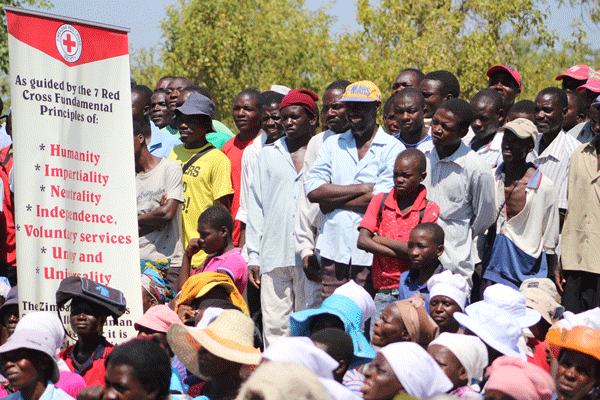
The Zimbabwe Red Cross Society (ZRCS) has embarked on community resilience projects aimed at empowering communities so that they are able to withstand shocks such as those caused by recent disasters in Masvingo and Manicaland provinces.
By Staff Reporter

The five-year project which is being funded by the British Red Cross is being implemented in Masvingo’s Mwenezi district and Chipinge in Manicaland.
ZRCS secretary-general Maxwell Phiri said the community resilience project concept was meant to give communities ammunition to stand on their own without external support when disasters struck.
“Red Cross has shifted its focus from the remedial kind of assistance to building community resilience with the aim of empowering communities so that they are able to withstand future shocks caused by disasters,” Phiri told The Standard Style.
“The concept of resilience has emerged as a longer-term more cost-effective strategy for substantially improving regional or local capacity to withstand such shocks and stresses. The International Federation of Red Cross Framework for Community Resilience defines it as ‘the ability of individuals, communities, organisations, or countries exposed to disaster, crises and underlying vulnerabilities to anticipate, prepare for, reduce the impact of, cope with and recover from the effects of shocks and stresses without compromising their long-term prospects’.”
Phiri said their focus in Mwenezi and Chipinge was to equip communities so that they were able to stand on their own without external support.
“We want to improve livelihoods and resilience of communities in Chipinge and Mwenezi districts focusing on areas such as food security and livelihoods, water, sanitation and hygiene as well as disaster risk reduction,” he said.
- Chamisa under fire over US$120K donation
- Mavhunga puts DeMbare into Chibuku quarterfinals
- Pension funds bet on Cabora Bassa oilfields
- Councils defy govt fire tender directive
Keep Reading
Phiri said at the end of the day, communities and households would be better able to anticipate, adapt and respond to disasters at household and community level.
ZRCS is working with 1 000 beneficiaries in wards 16, 20 and 24 in Chipinge and another 1 000 in Mwenezi’s wards 5, 8 and 14. The beneficiaries are expected to increase to 2 500 in each district after four and half years.
Phiri said ZRCS was working with the Local Government ministry and other stakeholders to empower communities.
“ZRCS is setting up centres of excellence in both districts to help educate farmers on issues like water harvesting technologies, improved and climate smart agriculture with also a focus on better animal management,” Phiri said.
“The programme also includes the rehabilitation of water points in both districts and construction of water troughs. For purposes of sustainability, water point committees are also being trained. The project also provides training to help with hygiene promotion in schools and homes.”
Phiri said care givers would be trained to provide nutrition education to pregnant and lactating mothers. The trained mothers would be provided with support to set up nutrition gardens.
Under disaster risk reduction activities, focus will be given to equipping communities to be knowledgeable about their hazards and risks.
“ZRCS volunteers would receive training in first aid as well as support with first aid kits so that they are better equipped to provide first aid services,” Phiri said.











